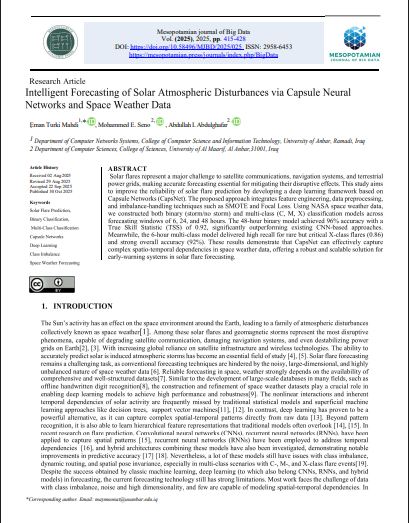Intelligent Forecasting of Solar Atmospheric Disturbances via Capsule Neural Networks and Space Weather Data
Main Article Content
Abstract
Solar flares represent a major challenge to satellite communications, navigation systems, and terrestrial power grids, making accurate forecasting essential for mitigating their disruptive effects. This study aims to improve the reliability of solar flare prediction by developing a deep learning framework based on Capsule Networks (CapsNet). The proposed approach integrates feature engineering, data preprocessing, and imbalance-handling techniques such as SMOTE and Focal Loss. Using NASA space weather data, we constructed both binary (storm/no storm) and multi-class (C, M, X) classification models across forecasting windows of 6, 24, and 48 hours. The 48-hour binary model achieved 96% accuracy with a True Skill Statistic (TSS) of 0.92, significantly outperforming existing CNN-based approaches. Meanwhile, the 6-hour multi-class model delivered high recall for rare but critical X-class flares (0.86) and strong overall accuracy (92%). These results demonstrate that CapsNet can effectively capture complex spatio-temporal dependencies in space weather data, offering a robust and scalable solution for early-warning systems in solar flare forecasting.
Article Details
Issue
Section

This work is licensed under a Creative Commons Attribution 4.0 International License.
